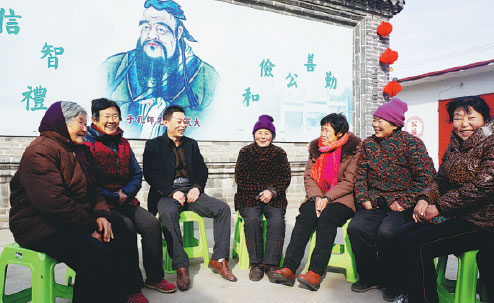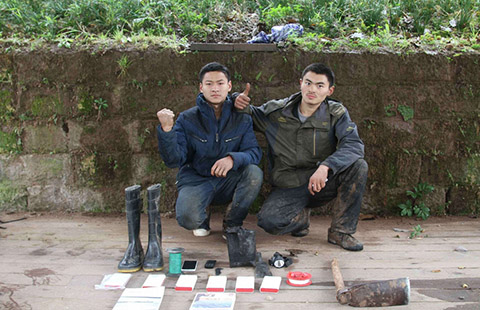TCM ethos employed to cure countryside ills
By Zhao Xu (China Daily) Updated: 2016-02-26 08:06|
Yang Hong (third from left), head of Shuyuan village, presides over a meeting with leading members of the mutual-help group. |
Vested interests
Wang Zhengwei, who joined Global Village in 2013, directly after leaving the Chinese Academy of Social Sciences where he conducted postgraduate research, was among the workers thrown out of the village.
"Vested interests are often the reason behind officials' strong resistance," the 27-year-old said. "Once, we were nearly expelled by a village head in Sichuan province, who had shares in a local mine that was a major source of environmental pollution locally."
When villages express an interest in the LoHo project, Wang provides an introduction to the project by "stewarding" the first round of joint meetings.
"In rural areas, it's not unusual to find a village chief with a strong character, a strong will, and often, a strong hand. In the beginning, before they learned about the system, some had to be constantly reminded to stop occasionally and ask the other participants for their opinions," he said. "At the same time, the villagers had to be encouraged to participate and speak their minds."
According to Liao, the key to earning genuine support from village chiefs is to place them firmly at the center of the project. "The whole thing is spearheaded by the village government, with the village head chairing the joint meeting. Our role is that of an incubator and facilitator," she said.
Liao, who describes herself as "a pragmatist first and foremost", understands the subtle politics of her work and the importance of gaining the support of the higher authorities. "In February last year, the State Council promulgated a guideline about improving reform and speeding up agricultural modernization. In the document, the government clearly stated its policy to encourage pilot projects to establish natural village-based self-governing bodies," she said. "Without the sanction of at least the county-level government, most village chiefs simply say no."
During the past eight years, Liao's team has helped to introduce the LoHo system to 12 villages in Chongqing municipality and 48 villages in Hunan province. The initiatives in Shandong represent their latest project.
Liao's team is partially funded by local governments who need professional help to get the LoHo system off the ground. Liao routinely recruits local people of both genders, mostly in their 20s and 30s, who previously worked a variety of jobs in the cities. "They belong to this land," she said.
Reconnection
For Yang, of Shuyuan village, LoHo is about reconnecting with history. The village name means "house of learning", and an enclosed area, measuring about 130,000 square meters and dotted with ancient halls and buildings stands on its western fringe. It's believed that Confucius (551-479 BC), China's most-famous teacher and philosopher, taught there.
"Throughout history, rural China has been the breeding ground of our culture and civilization. Its decline during the past 40 years can be attributed to many factors, but the most destructive aspect of this decline is the loss of both morals and confidence," Yang said. "No construction is possible without the revival of those two things, and revival is impossible without people taking the initiative."
The show where the women performed the umbrella dance ended mid-afternoon, and five hours later, at around 9 pm, Liao was back in Beijing. Sitting in a taxi at the train station, she took a long, deep breath and looked out of the window at the chilly night.
"Rural China suffers from many ailments. For any cure to have a chance of working, it must take the rural society as a whole and not focus solely on surface issues," she said.
"When the cyst in my left ovary disappeared, I knew that my future child and I were indebted to the doctor for life, but it wasn't until I adopted the principles of traditional Chinese medicine in my social work that I finally felt as though I had said a proper 'thank you'."

- China's lunar probe sets record for longest stay
- Shanghai teachers win high marks
- Xi to meet Obama soon, premier says
- New legislation outlaws domestic abuse
- Life sentence upheld for former Bo Xilai aide
- Hopes voiced for next five years
- Efforts urged to improve money laundering law
- Luring shoppers home with quality
- China cuts red tape on intermediary services for administrative approval
- Unique brown panda survives winter








